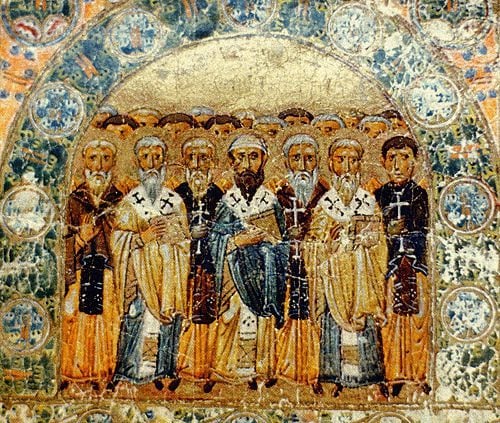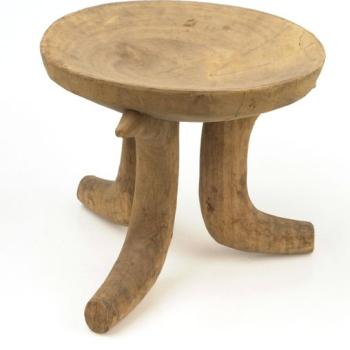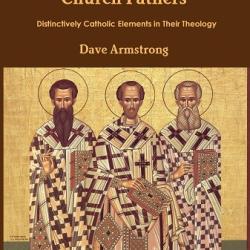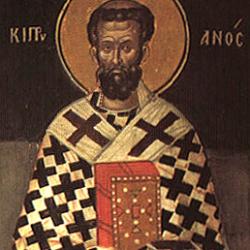
* * * * *
You presuppose that I am always referring to transubstantiation, when I am not necessarily doing so.
At some points, you use it simply as 1) a synonym for “Real Presence” as when you quote Williston Walker saying the “Real Presence” is known from the 2nd century and think this is actually relevant to the issue at hand. (All Lutherans believe the doctrine of the Real Presence is apostolic in origin.)
Another misinterpretation: “Real Presence” is not at issue; transubstantiation is. I don’t think transubstantiation is a “synonym” for real presence; I think it is one particular interpretation of the larger category. I cited Walker mainly for the second sentence in the citation: “The essentials of the ‘Catholic’ view were already at hand by 253.” The “Catholic” view involves transformation. This was my particular argument in context. Now, it may be the case that this wasn’t what Walker had in mind (thinking only of a more generic notion of “Real Presence”). That’s a legitimate concern. The other two historians I cited, however (Pelikan and Schaff), did make it clear that transformationism was taught early on. Schaff wrote (about the period prior to 600):
In general, this period, . . . was already very strongly inclined toward the doctrine of transubstantiation.
Pelikan noted (also referring to the time period before 600 A.D.):
[T]hese and similar passages in Theodore are an indication that the twin ideas of the transformation of the eucharistic elements and the transformation of the communicant were so widely held and so firmly established in the thought and language of the church that everyone had to acknowledge them.
In any event, I was not at any time equating Real Presence and transubstantiation (because I’ve never believed that, and it is rather silly). I was replying to the charge that transubstantiation necessarily relies upon Aristotle. So throw out Walker as not explicit enough, if you like, but you still have to deal with Pelikan and Schaff.
2) At other times you use it for the non-philosophical belief that after consecration there is no bread and wine, only our Lord’s body and blood, in the Supper.
That’s right: transformation again.
Yet at other times, you use the term for 3) the specific Thomistic doctrine, phrased in philosophical language, that the accidents of bread and wine remain while the substance is that of Christ’s body and blood.
Again, I’d have to see what it is (specifically) in my argument and words that you object to. That requires quoting words and making some sort of argument, rather than this sort of “meta-analysis” that wants to speak generally, rather than taking on the burden of a comprehensive reply (i.e., an actual dialogue). The real learning and education (and challenge) comes in actually directly interacting with critics and other views.
Josh’s point was that definition 3 stand or falls on the adequacy of the philosophical distinction of substance and accident, as a way of speaking about ordinary material entities. If that philosophical analysis does not work, as a way of dealing with matter, then transubstantiation in definition 3 is useless because it explains miraculous, spiritual realities in terms of an obsolete philosophical physics.
I don’t believe that the Catholic doctrine necessarily relies on Aristotle. This is a very common complaint, but I deny that it is true in the first place.
You may still go back to definition 2, but you have to then admit that definition 3 was never actually an eternally valid dogmatic formulation, only a temporarily useful theological opinion.
I always did admit that, so it is no problem. That’s why I kept mentioning that the Orthodox accept total transformation without getting into all the philosophical particulars and “rationalism” (so do the Fathers). The essence of the doctrine is transformation. That’s what I defended. And of course I critiqued other alternative explanations (Reformed / Lutheran).
The heart of Josh’s argument is that substance-accidence philosophy is in fact obsolete and that therefore Aquinas’s transubstantiation is at best a very clumsy, rebarbative, and obsolete way of stating what Theodore, Chrysostom, and the other post-Nicene fathers you cited stated in a non-philosophical way.
Let him come defend his entire post and critique mine.
You do then have to explain 1) why it is that no ante-Nicene father actually expresses that doctrine;
They express transformation. This is precisely what we would expect, because there were still many centuries of development yet to occur (as with many other, if not most, doctrines). What the Fathers show us is what Schaff said about them: they were “very strongly inclined toward the doctrine of transubstantiation.” You can either say he is all wet or drop this objection as pointless.
2) why the analogy of bread: Christ’s body: Christ’s human nature: Christ’s divine nature is the first, most common, and principal ante-Nicene explanation of the Real Presence; and 3) what authority the hierarchy ever had to declare an obsolete (albeit temporarily useful) opinion a dogma of the Church.
The philosophy is not essential to the definitions and dogma. You don’t like the terminology of “substance” and “accidents”? Then give us a better philosophical (or theological) explanation. The Catholic Church has authority because of Petrine primacy and apostolic succession. How and why does Lutheranism have authority, and why should all be subject to it?
On what basis should Catholics have accepted Luther’s dissident claims, as he was simply one man with a bunch of opinions (some right, some wrong)? Or for that matter, the Book of Concord? If you can’t trace your opinions back to the apostles, then they are of little worth. They’re just . . . traditions of men (in the negative sense of that term; unbiblical and unhistorical opinions).
The business about fine points of Lutheran eucharistic theology is very interesting, but remember that the subject at hand was critiques of transubstantiation. I’d be happy — delighted — to learn more about Lutheran theology, but one thing at a time. Let’s be sure we understand what the Catholic doctrine is, and the defense for it, before going on to another major topic.
And do you think the Catholic Church is a Christian institution, every bit as worthy of that name as Lutheranism or any Protestant denomination?
The “trademark” on the term consubstantiation was secured by the Franciscans a long time before Luther. Thus to say the Lutherans teach consubstantiation is to say that they follow the arguments and modes of thinking of the Franciscans on the Lord’s Supper. This is not true; while there are areas of similarity, the mode of thinking about the Lord’s Supper and the context of the doctrine in the Lutheran and Franciscan traditions is fundamentally different. Thus one could say, “the Lutheran doctrine of the Real Presence bears a number of similarities to consubstantiation” but not “the Lutheran confession teach consubstantiation.”
In your reply to my final points you didn’t understand my point since you evidently did not notice the word “ante-Nicene”. I asked “why it is that no ante-Nicene father actually expresses that doctrine?” You pointed me again to Schaff saying in his history of the church from AD 311 to 600 that in that period most believed in transformation. Interesting, but irrelevant, since ante-Nicene means before 311, not after. And again you point me to Pelican who cites Theodore. Again interesting but irrelevant, since Theodore’s dates [c.350-428] are not ante-Nicene. Williston Walker says “the essentials of the ‘Catholic’ view were already at hand by 253.” OK that’s at least relevant to the ante-Nicene issue, but I’d like to know what he considers “the essentials” and I’d like to know what he means by “at hand” (is it “expressed by one or two persons” or “expressed by a consensus” or what?). If you have an ante-Nicene father on hand clearly expressing the transformation point of view, or the absence of bread and wine, I would certainly consider this is evidence to be considered on your side. Whether it outweighs the strong evidence of early theologians such as Irenaeus that the bread and wine remain, is another question.
Even with the post-Nicene fathers there is important evidence on the Lutheran side in passages such as this, by Pope Gelasius (AD 492):
Certainly the Sacraments of the body and blood of Christ are a divine thing, through which we are made partakers of the divine nature; and yet the substance or nature of bread and wine does not cease to be (tamen esse non desinit substantia, vel natura panis et vini).
You’re right. I didn’t notice the “ante-Nicene” part of your query. That is harder to find indeed, because of the lower level of development (Christology is the same, so this should cause no great alarm to our position or anyone else’s on this).
I found one quote from St. Justin Martyr; see what you think of this:
For not as common bread and common drink do we receive these; but in like manner as Jesus Christ our Saviour,having been made flesh and blood for our salvation,so likewise have we been taught that the food which is blessed by the prayer of His word,and from which our blood and flesh by transmutation are nourished, is the flesh and blood of that Jesus who was made flesh. (First Apology, 66; A.D. 110-165,in ANF, I:185)
Catholic William Jurgens, in his translation, has the phrase “. . . the food which has been made into the eucharist by the Eucharistic prayer . . .” Perhaps he shows some bias there; I don’t know. That would be for the patristic and Greek scholars to work out. Jurgens also translates St. Irenaeus (Against Heresies, V, 2, 2), writing:
When, therefore, the mixed cup and the baked bread receives the Word of God and becomes the Eucharist, the Body of Christ . . .
(Jurgens, The Faith of the Early Fathers, Vol. 1, 99)
Do these qualify as primitive versions of transubstantiation?
Let me first lay down the ground rule that both those who hold the Lutheran position and those who hold to transubstantiation can say of the bread, “This is the true body of our Lord and Savior Jesus Christ” (indeed my Lutheran pastor says it to me every Sunday as he offers me the bread). Compare: both the docetist and the orthodox Christian can say of the man Jesus, “This is the living God.” Where they differ is that the docetist says, “there is no real body, no real human nature there,” while the orthodox Christian says, “yes, this is the living God, but also a true man, with true body and true human nature.” Just so, the difference between the Roman Catholic and the Lutheran on the Eucharist is that the Roman Catholic says “there is no real bread, no real substance of bread there,” while the Lutheran says “yes, this is Christ’s true body, but also true and natural bread.” So simple assertions that this bread is the “true body of our Lord” do not establish the transubstantiation position, but simply the Real Presence. What is needed to distinguish between these two dogmas of the Real Presence, is some actual denial of the reality of bread, or a denial of the full analogy between the sacramental union of Christ’s body and bread and his two natures, or some other additional phrasing.
The illustration of this is quite clear in Irenaeus, who in Book V.2 as you note, writes (arguing against those who deny the resurrection of the flesh):
When, therefore, the mingled cup and the manufactured bread receives the Word of God, and the Eucharist of the blood and the body of Christ is made, from which things the substance of our flesh is increased and supported, how can they affirm that the flesh is incapable of receiving the gift of God, which is life eternal, which [flesh] is nourished from the body and blood of the Lord, and is a member of Him?
Here the Real Presence is asserted, but not specifically transubstantiation. This becomes clear in chapter IV.18 when this founder of Christian theology goes into greater detail (again speaking of docetists who deny the resurrection of the flesh):
Then, again, how can they say that the flesh, which is nourished with the body of the Lord and with His blood, goes to corruption, and does not partake of life? Let them, therefore, either alter their opinion, or cease from offering the things just mentioned [i.e. Eucharistic elements]. But our opinion is in accordance with the Eucharist, and the Eucharist in turn establishes our opinion. For we offer to Him His own, announcing consistently the fellowship and union of the flesh and Spirit. For as the bread, which is produced from the earth, when it receives the invocation of God, is no longer common bread, but the Eucharist, consisting of two realities, earthly and heavenly; so also our bodies, when they receive the Eucharist, are no longer corruptible, having the hope of the resurrection to eternity. (Emphasis added).
Irenaeus’ Eucharistic theology, as seen in this well known (at least to Lutherans) passage, is clearly incompatible with transubstantiation. If your source, William Jurgens, let you going into a debate ignorant of this passage, you ought to demand your money back.
Thus in reading Justin Martyr, let us first of all note (in case it was in doubt) that the “transmutation” (metaboleen) in context here clearly refers to the natural metabolism of bread and blood into our body, not to transubstantiation (as some tried to argue in the past). This is the same point which Irenaeus emphasized in V.2. More importantly, note that the analogy of God’s becoming incarnate as flesh is specifically stated to be the manner by which the sacrament is the body of Christ. The presumption is thus that there are two natures in the sacrament as well. In any case, Justin Martyr’s words do not sharply divide between the two views of the Real Presence, although they lean in a Lutheran-type direction.
In particular, the close similarity in reasoning between these two writers who seem to have no literary dependence, indicates that Irenaeus and Justin Martyr drew on a common second-century Eucharistic theology, and that that theology (the first known theology of the Eucharist) is clearly incompatible with transubstantiation’s denial of the nature of bread remaining in the sacrament, and just as clearly compatible with Lutheranism’s affirmation of that nature, and our fundamental analogy of the sacramental union of bread and Christ’s body with the personal union of Christ’s two natures.
I can’t debate further Justin Martyr’s and Irenaeus’ views. That would be for scholars. I appreciate the further information you have provided. Let me just ask you, then: granting that transformational views became prevalent in the 4th and 5th centuries and thereafter, how do (or, would) you account for that? Would you say that the doctrine became corrupted beyond repair at that time, leading up to the “excesses” of medieval Catholic theology and theory?
If so, then why do you think that the same Fathers in the same time period got Christology right (where we would agree), but got eucharistic theology so wrong, and took it in the wrong direction?
And moreover, on what basis does one decide that the Fathers (taken as a whole) were right on doctrine x, but wrong on doctrine y? If the individual decides, then you leave yourself open to all the charges against individualism, as unbiblical, leading to rampant sectarianism and de facto theological relativism, etc. If it is a group (Catholic Church or Lutheran Church or Reformed Church, etc.), on what basis do we decide the authority of such a group to make such a determination, over against competing claimants? And would it not be required to establish an unbroken chain of doctrine, back to the apostles?
Granting the latter notion, it then becomes a problem if the 3rd century Fathers flat-out denied transubstantiation (as you seem to be arguing), but the 4th and 5th century Fathers asserted it (which would be a reversal of what came before). The patristic consensus would thus become a pretty big difficulty for those who deny what the later Fathers, with one to two centuries more reflection and development, came to believe.
J. N. D. Kelly attests to the facts of eucharistic theology in the 4th and 5th centuries:
Almost everywhere, however, this conception of the sacrament was yielding ground to the more popular, vividly materialistic theory which regarded the elements as being converted into the Lord’s body and blood . . . [he then cites Athanasius, Cyril of Jerusalem, and Gregory of Nyssa] . . . from this time onwards the language of conversion became regular in the East. . . . In the fifth century conversionist views were taken for granted by Alexandrians and Antiochenes alike.
Also, Kelly writes of the period:
[T]he eucharist was regarded without question as the Christian sacrifice. (Early Christian Doctrines, San Francisco: Harper, revised edition of 1978, 442-444,449)
So the Lutheran task (and that of anyone who denies both transubstantiation and the Sacrifice of the Mass, as you do) is to explain how both “corruptions” became the norm and the standard theology by the 4th century, or 5th at the latest. The Catholic, on the other hand, can simply hold that earlier views were so primitive in development that the notion of conversion was not yet dealt with (similar to many aspects of Christology, which took many centuries to be fully explicated). The historical data poses no serious difficulty for us.
I appreciate your basic concession that the conversionist view is a post-Nicene innovation, which will spare me from quoting Cyprian on how the wine is “sanctified by the blood of Christ,” etc., etc. If Kelly had in fact said the same thing (as he seems to have from your quotation), you too could have spared us the debate by stipulating that at the beginning.
This all depends on what you mean by “post-Nicene innovation.” If by that you mean that doctrine radically reversed itself, so that what was generally accepted in the 4th and 5th centuries was a corruption of what came before (and a contradiction, and therefore, false doctrine), then I don’t believe that at all (and nothing I wrote suggests it).
But if you mean that doctrine developed, and new ways of understanding arose, concerning what was already accepted in a more general, primitive way (a deeper understanding and more explicit explanation of eucharistic doctrine), then yes, I do accept that. My opinion is that the transformational motif and theology was a consistent development of the teachings on real presence before Nicaea. This became the patristic consensus. And it is what you must explain, because it goes against your Lutheran theology (which claims to hearken back to patristic theology).
I don’t agree, however, that Irenaeus’s view was, however, “so primitive in development.” By what independent standard is it to be considered “primitive”?
By the patristic consensus and more highly developed theology later on. The earlier understanding of theology is interpreted within the framework of hindsight, from the vantage-point of what later arose. This is true of all Christian doctrines (including those upon which you and I would agree). This is “independent” because it relies upon the data of history: what did the Fathers (generally) believe in the 3rd century, 5th century, 7th century, and so on?
Once that is determined, then one must decide how authoritative the Fathers as a group of teachers are, and how they will decide what to accept and what to reject in their teachings. The authority of some Church somewhere will necessarily have to be accepted, to do that. The task is to come up with a consistent, coherent interpretation of both biblical theology and the history of theological opinion within the mainstream Christian tradition. This notion was explained by Jaroslav Pelikan, writing as a Lutheran:
Tertullian’s summary of these four gifts makes it clear “that by the end of the second century, if not fifty years earlier, the doctrine of baptism (even without the aid of controversy to give it precision) was so fully developed that subsequent ages down to our own have found nothing significant to add to it.”
The same cannot be said in any sense about the doctrine of the real presence of the body and blood of Christ in the Eucharist, which did not become the subject of controversy until the ninth century. The definitive and precise formulation of the crucial doctrinal issues concerning the Eucharist had to await that controversy and others that followed even later. This does not mean at all, however, that the church did not yet have a doctrine of the Eucharist; it does mean that the statements of the doctrine must not be sought in polemical and dogmatic treatises devoted to sacramental theology. It means also that the effort to cross-examine the fathers of the second or third century about where they stood in the controversies of the ninth or sixteenth century is both silly and futile.
Perhaps the best illustration of such futility is the controversy that has been carried on, at least since the sixteenth century, over the eucharistic teaching of Irenaeus, especially over one passage [Heresies 4, 18, 5: the very one cited by CPA above as a “slam dunk” for his position].
. . . no orthodox father of the second or third century of whom we have record either declared the presence of the body and blood of Christ in the Eucharist to be no more than symbolic (although Clement and Origen came close to doing so) or specified a process of substantial change by which the presence was effected (although Ignatius and Justin came close to doing so).
. . . the adoration of Christ in the Eucharist through the words and action of the liturgy seems to have presupposed that this was a special presence, neither distinct from nor merely illustrative of his presence in the church.
. . . The theologians did not have adequate concepts within which to formulate a doctrine of the real presence that evidently was always believed by the church even though it was not yet taught by explicit instruction or confessed by creeds.
As Irenaeus’s reference to the Eucharist as “not common bread” indicates, however, this doctrine of the real presence believed by the church and affirmed by its liturgy was closely tied to the idea of the Eucharist as a sacrifice. Many of the passages we have already cited concerning the recollection and the real presence spoke also of the sacrifice . . . One of the most ample and least ambiguous statements of the sacrificial interpretation of the eucharist in any ante-Nicene theologian was that of Cyprian, who is also one of the earliest authorities for the sacerdotal interpretation of the Christian ministry. In the course of a discussion of liturgical problems, Cyprian laid down the axiom:
If Jesus Christ, our Lord and God, is himself the chief priest of God the Father, and has first offered himself a sacrifice to the Father, and has commanded this to be done in commemoration of himself, certainly that priest truly discharges the office of Christ who imitates that which Christ did; and he then offers a true and full sacrifice in the church to God the Father, when he proceeds to offer it according to what he sees Christ himself to have offered.
This was based on the belief that “the passion of the Lord is the sacrifice which we offer.” The sacrifice of Christ on Calvary was a complete offering; the sacrifice of the eucharist did not add anything to it, nor did it “repeat” it, as though there were more than one sacrifice. [Cyprian references: Epistles, 63, 14; 63, 17]
. . . The much-debated words of Justin about the “transmutation” taking place in the Eucharist may be a reference either to the change effected in the elements by their consecration or to transformation of the human body through the gift of immortality or to both.
. . . Liturgical evidence suggests an understanding of the Eucharist as a sacrifice, whose relation to the sacrifices of the Old Testament was one of archetype to type, and whose relation to the sacrifice of Calvary was one of “re-presentation,” just as the bread of the Eucharist “re-presented” the body of Christ.
. . . Great theological refinement was needed before these modes of speaking could be built up into a eucharistic theology; above all, the doctrine of the person of Christ had to be clarified before there could be concepts that could bear the weight of eucharistic teaching.
. . . It was only after the conflict between Augustine and the Donatists that Western theology was able to begin constructing a full-blown theory about the nature and number of the sacraments, and it was not until the Middle Ages that such a theory was evolved. But the early centuries in the development of doctrine had the assignment of clarifying the function of the church as the means of grace; this clarification was the prerequisite for any understanding of the word of God and the sacraments. (The Christian Tradition: A History of the Development of Doctrine: Volume 1: The Emergence of the Catholic Tradition (100-600), University of Chicago Press: 1971, 166-171; citing Ernest Evans, Tertullian’s Homily on Baptism, London: 1964, xxix; emphasis added)
How can you demonstrate that conversionism won out over the two natures view of the Eucharist due to its greater “advancement”, except of course by simply assuming that a view which lost out must be more primitive?
It “won out” because that was God’s plan for the development of true eucharistic theology. The Catholic has faith that God can protect His Church from error. If you believe, on the other hand, that God cannot do so, then you would expect to find doctrinal error and confusion all over the place. We would then be on our own. We believe that a God Who could become man is able to preserve true doctrine and theology in the Body of Christ, the Church: an extension of the Incarnation. It’s no more difficult to believe in a Body of Christ which is protected by God the Father than it is to believe in the Incarnation itself.
We accept this on faith, and so we believe that the history of the Church has great importance as to what is true doctrine and what isn’t. St. Paul passed down the apostolic deposit. History helps us determine what this doctrine was, and how it consistently developed through the centuries. Catholic apologist Mark Shea explains (in agreement with Jaroslav Pelikan’s opinions above) why transubstantiation was a much later development than real presence itself:
[T]he Eastern Church fathers coined the term meta-ousiosis (literally “change of being”) to describe the Eucharistic miracle at consecration. So in both East and West, we have virtually no evidence that it even occurred to any orthodox believer to doubt the Eucharist is the body and blood of Christ for centuries.
But in the 9th Century, there arise the first ripples of real controversy. At this time, a French monk named Ratramnus asks in essence, “But how can this be the body and blood of Christ?” He holds that Christ’s body in the Eucharist cannot be the same as Christ’s crucified and risen body because the Eucharistic body cannot be seen or felt. In a word, for Ratramnus, the Real Presence is “spiritual” (and therefore not physical). This line of reasoning inevitably leads Ratramnus (and all those who follow his lead) to increasingly regard the Eucharist as a “mere symbol” of the “true” (meaning “non-physical”) reality rather than as the true body and blood taught by the Apostles. Eventually, his theory is condemned by the Synod of Vercelli, but the controversy continues for two more centuries and Ratramnus is at length championed by Archdeacon Berengar of Tours. In response to this, Pope Gregory VII writes a formal declaration of the Church’s faith (reiterating the biblical and patristic teaching concerning the literalness of the Church’s belief on the point) and requires Berengar to submit to it. But the ferment continues.
It is in the midst of this ferment that the term “transubstantiation” is finally coined by the Western Church in the 13th Century to more precisely define how the “being” or “substance” of the bread and wine is divinely changed into the being or substance of Christ Jesus. But as we have already seen, this belief (now expressed under a newly coined term) is not itself new. Thus, transubstantiation turns out to be, not pulled from thin air, but rooted in the same revelation the Eastern Church had tried to describe centuries before with the term meta-ousiosis. And meta-ousiosis is itself merely a more technical way of reiterating the clear (though mysterious) teaching of our Lord and his Apostles in Scripture. Paradoxically, the Church invented a new word so it could continue guarding a very old revelation from Christ himself. (“The Real Presence and the Development of Doctrine,” 2001)
Furthermore, the same person, St. Irenaeus, whom you want to cite in favor of your view, believed in the Sacrifice of the Mass, which you reject:
. . . [Jesus] taught the new oblation of the new covenant, which the Church, receiving from the Apostles, offers to God throughout the world . . . concerning which Malachy, among the twelve prophets, thus spoke beforehand [he then cites Malachi 1:10-11] . . . indicating in the plainest manner by these words, that the former people (the Jews) shall indeed cease to make offerings to God, but that in every place sacrifice shall be offered to him, and that a pure one; and his name is glorified among the Gentiles. (Heresies, 4, 17, 5, ANF)
You still have, therefore, several serious problems to resolve:
1. How can a Lutheran maintain historical continuity of eucharistic doctrine, leading up to the Lutheran view, given the fact of widespread acceptance of conversionist or transformational views on the Eucharist (primitive versions of the later highly-developed transubstantiation) by the 4th and 5th centuries (which Lutheranism rejects)?
2. How does a Lutheran account for the early Fathers’ widespread acceptance of adoration of the consecrated elements (which Lutheranism rejects)?
3. How does a Lutheran account for the early Fathers’ widespread acceptance of the Sacrifice of the Mass (which Lutheranism rejects)?
The Catholic position entails none of these difficulties. We agree with the two latter beliefs, which developed more rapidly than transubstantiation. And we can easily explain why the “hows and whys” of the Eucharist developed more slowly, and show that earlier statements do not necessarily contradict the later understanding (and individual Fathers can always be mistaken).
We agree with Pelikan that it is “silly and futile” to try to find in the earliest Fathers a decisive conclusion one way or the other, and that, at this early stage, they “did not have adequate concepts within which to formulate a doctrine of the real presence,” and that “great theological refinement was needed before these modes of speaking could be built up into a eucharistic theology.” Since all of this was written by an eminent Church historian who was Lutheran then, and Orthodox now, it obviously isn’t the analysis of a Catholic partisan (or Catholic apologist like myself).
As for the answer to your questions about authority, they seem so simple to me that you will undoubtedly bang your head against a wall in frustration when I say, that what developments in church tradition are correct can be decided by comparing them to Scripture.
I see nothing in transubstantiation which is contrary to Scripture. But I would contend that Scripture isn’t explicit enough on this matter to resolve it. That’s nothing unusual. Scripture says nothing at all definitive about the so-called “biblical” doctrine of sola Scriptura. That didn’t, however, stop Luther and Lutherans and other Protestants from arbitrarily adopting this unbiblical doctrine (and radically new innovation) and making it their very centerpiece of authority and epistemology; indeed, their rule of faith, upon which everything else is judged. There is nothing whatsoever in the Scripture about the biblical canon.
That was accepted on Church authority. One does find in Scripture a strong literalism regarding the Eucharist being the Body and Blood of Christ. If that is true, then obviously the bread and wine had to become transformed (either partially or totally, if they still remain in some fashion alongside the True Body and Blood). And that leads us right to speculation about transformation. This is what took centuries to develop (just as Christology and things like the canon of Scripture and, e.g., the doctrine of original sin, did).
It is of course a presupposition of Roman Catholic and Orthodox apologetics that Scripture, indeed any written document, is so multivocal as to be essentially useless as a source of authority.
It is? That’s news to me. I have never heard this before, and I have been doing Catholic apologetics for over 14 years, and general Christian apologetics for 24 years. You obviously have only a dim knowledge of our viewpoint with regard to authority in general, and biblical authority in particular. But that’s a huge topic, for another time. I want to merely make it abundantly clear (as an apologist who represents and defends Catholic theology) that you are grossly misrepresenting what either Catholics or Orthodox believe about the authority of the Bible.
I simply disagree with this nihilistic skepticism of written texts in general and Scripture in particular.
Yes, so do we! I see no reason to create differences where there are none. What we deny is sola Scriptura, but that is a far different thing from denying the authority of Holy Scripture (which explicitly denies sola Scriptura in the first place).
(And to your question of “if Scriptural authority is effective as authority how come there is such multiplicity of interpretations?”
I’d have to see a direct citation of what I wrote. If I wrote the above, it would have to be interpreted as expressing opposition to sola Scriptura, not at all to biblical authority itself. The latter is merely your erroneous take on my argument.
I will simply respond “if apostolic succession is so effective as authority, how come there is such a multiplicity of independent churches—Roman, Eastern Orthodox, Oriental Orthodox, Anglican, Swedish Lutheran, Assyrian—not in communion each claiming it?”
All that would prove is that Christians tend to be sectarian. One has to examine each particular case. I have shown in this paper how the Fathers accepted the Sacrifice of the Mass and adoration of the consecrated elements. These are Catholic beliefs (and to a large extent, Orthodox ones). There are many other such doctrines that could be scrutinized (e.g., Mariology, ecclesiology, penance, soteriology). We can show that Catholic doctrine is in continuity with the consensus of the Fathers on all these issues. That is how one decides which Church has preeminent authority. This was how the Fathers themselves decided the issue.
and “if Papal authority is so effective as an authority, how did it happen that by 1054 not a single other apostolic or patriarchal see recognized that authority?”
Oh, there are many reasons for that. But the fact that someone doesn’t recognize what is, in fact a truth, is no disproof of that truth. Obviously, Christian truth is not determined by taking a head count.
Practically speaking, you and I both recognize that conversionist vs. two-natures views of the Eucharist are rather minor distinctions compared to the Trinity, or even justification by faith alone. (This is clear from our recognition of each others’ baptisms, and from our dogmatic statements.) Hence I too have no “serious difficulty” saying that while being confronted with and successfully battling a fundamental challenge to the faith, the post-Nicene fathers let a number of mistaken, albeit non-fundamental, views come to prominence. Indeed there remained churchmen in good standing espousing two-natures views of the Eucharist for centuries and the matter was never formally pronounced upon by any council in ancient church.
Your “answer,” then, to your historical difficulties, is to simply posit that the Fathers were mistaken en masse on something so central to Christianity as the very act of weekly worship. They got it wrong concerning the Sacrifice of the Mass and Eucharistic Adoration, thus leading Christians to a notion of worship which is considered rank idolatry by many Protestants today, and was also by Luther and Calvin, when they started putting their revolutionary novelties into place. This included almost all of the Fathers (even as early as St. Irenaeus, as shown above). After the 4th century or 5th at the latest, acceptance of transformational views of the Eucharist was quite widespread as well.
But you can deny all that because the system of sola Scriptura ultimately reduces to a-historicism and skepticism of almost all ecclesiastical authority. In the end, the individual is free to (indeed, highly encouraged) to discover every theological truth on their own (in consultation, of course, with pastors and scholars). Hence, we see the resulting chaos and de facto relativism in Protestant theology, almost from the beginning. That’s the fruit of your Protestant experiment.
We Catholics, on the other hand, believe that the Catholic Church is preserving (and has historically preserved) the original apostolic deposit of faith, developed but essentially the same as what was received from the apostles; passed down through apostolic succession and protected by the guidance of the Holy Spirit, particularly by the popes and ecumenical councils. None of the patristic historical data we have been discussing overthrows our understanding of doctrine (including eucharistic doctrine) or authority at all, but it creates several insuperable problems for your view (insofar as you wish to trace your beliefs to those same Fathers as a group of theologians, over against Catholics or Orthodox, or even historically-minded Protestant groups such as traditional Anglicans).
***
As for the argument about Irenaeus, i.e. my “claim that St. Irenaeus’s use of ‘two realities’ meant that the Eucharist was both truly bread/wine and truly Body/Blood” Dave Armstrong has not yet (to my knowledge) presented a shred of evidence to contradict that.
Whatever the case, neither have you provided any “shred of evidence” to contradict my interpretation or suggested possibilities. My opinion is that: 1) his language is sufficiently ambiguous to allow different interpretations (which is why they exist in fact, and why these passages are so disputed by scholars), or 2) his language might possibly be consistent with later, more developed doctrine, or 3) he comes too early in Church history and the development of eucharistic theology, for us to be able to state with certainty what his particular position was (Pelikan’s argument). Another possibility is that he could have simply been wrong on this point.
What he has done (by citing Jaroslav Pelikan) is simply assert that many scholars believe that Irenaeus’s view can be understood within a “development of doctrine” perspective to be a primitive, unformed version of current Roman Catholic doctrine.
I don’t want to quibble with the details of Pelikan’s argument (people can read it above, without our extraneous commentaries), but suffice it to say that the Pelikan citation demonstrates that my view is just as feasible (if not much more so) than yours. And it comes from a non-Catholic scholar, thus eliminating charges of partisan polemics and bias.
He has also added the fact that Irenaeus used sacrifice language that could be “developed” (as Cyprian did) in ways that anticipate features of Roman Catholic doctrine that Lutherans object to.
This is a great exaggeration (and distortion). What was shown (and much more in the Fathers could be shown, believe me) was that the doctrine of the Sacrifice of the Mass was already fully in place and more or less fully-developed very early on. Therefore, it is inaccurate to characterize the situation with all your wishful qualifiers: “could be,” “in ways,” that “anticipate” Catholic distinctives, etc. This is yet another area where Lutheran appeal to the Fathers falls flat.
And that was my argument: “okay, even granting for the sake of argument that you have a better case concerning transubstantiation in the ante-Nicene fathers [which I don’t grant, because it is largely a non sequitur to do such analyses], you still have to explain the (for Lutherans and other Protestants) “disturbing” widespread, virtually universal patristic and early liturgical acceptance of eucharistic adoration and belief in the Sacrifice of the Mass. Of course, you can do no such thing.
In both cases, he may well be right; sure it can be so seen, if one is a priori convinced that Irenaeus as a canonized church father must have taught a form (however undeveloped) of current Roman Catholic doctrine.
It has nothing to do with believing something about Irenaeus’ position “a priori.” As Catholics, we are not required to believe anything at all about Irenaeus’ position, or that of any other Church Father. We are only bound to believe that there was a patristic consensus on various doctrinal matters (which allows of many exceptions). Individual Fathers are not regarded as infallible. We can follow the facts wherever they go.
So I’m simply approaching him as best I can, in order to determine what he taught on this matter. My Catholic bias is no more objectionable than your (or Pelikan’s) Lutheran bias. This is an unworthy attempt to make the argument about supposed “Roman hyper-dogmatism and blind faith (fideism)” rather than about the facts at hand, and a reasonable interpretation of them from an historiographical perspective.
But this is, sadly, what Protestants often do when confronted with historical facts that are not congenial to their position. They immediately switch the topic to: “but Rome is this, that, and the other, and it is a terribly unreasonable [and, often, unChristian] thing to accept that position because of a, b, c, d, e, f, ad infinitum . . . ” And so we are led far afield.
We wouldn’t be here if your argument had been a slam dunk against either my argument or the alleged “Catholic position” on Irenaeus (which doesn’t exist in the first place, because he could be wrong on this point, just as the Church decided that Augustine was wrong on some aspects of predestination, and Aquinas wrong about the Immaculate Conception, etc.).
Taken by itself, however, in the context of the texts we know of from that time, that is not the most natural way to understand his words as we have them,
So say you. But this is a matter for patristic scholars and other Church historians, not apologists and professors of Mongolian Studies. That’s why I freely deferred to scholars, because I admitted that I was not qualified to authoritatively interpret Irenaeus. So I went to Jaroslav Pelikan, a Lutheran (when he wrote the book I cited) and one of the most respected Church historians. He can speak with authority on this issue. And he agreed with my argument, which is why you felt compelled [below] to go after him and minimize the demolishing effect on your argument, of his words.
and you have presented no exegetical arguments whatsoever to convince me that it is.
We’re talking about what Irenaeus believed about the Eucharist a purely historical question, of fact), not what exegetical arguments can be produced for either side (which is exegesis and apologetics: completely different endeavors and questions).
So I don’t think I am being hyper-skeptical.
That may be. But you are definitely being hyper-unreasonable, as I think I am showing.
I don’t think any newcomer to this controversy, presented with Irenaeus’s words in context and with all the Scriptures and his contemporary Christian writers like Justin Martyr but nothing after his time would conclude that Irenaeus teaches anything like transubstantiation.
Of course not, because he comes too early in history to be relevant to that discussion (as Pelikan asserted; and I wholeheartedly agree with him).
Real Presence, yes; Christ’s true body and blood, certainly. But not transubstantiation. Which is not to say that they could not be “developed” in that direction. But “developed” and “is” are two different things.
As has been said,
By whom?
all questions in Roman Catholic theology ultimately come back to the church. So it proves again.
It does? I haven’t appealed to authoritative Catholic Church pronouncements at all in my argument. But it’s a convenient club, isn’t it? It attempts to divert the discussion to irrelevant issues about supposed Catholic views of authority (that you clearly poorly comprehend in the first place).
Dave Armstrong’s arguments add up to saying (over and over again), the Roman Catholic church teaching is a package deal. Anyone who does not accept all the Roman Catholic church currently teaches (from the Trinity to transubstantiation to the least jot and tittle of doctrine) has no right to appeal to any writer in the Christian tradition before the Reformation.
I’ve never argued this (nor does my apologetic “add up” to it)! Why don’t you actually document it, if you think I am making this claim? The present discussion proves this, because I refused to make a definitive claim about St. Irenaeus’ views one way or the other. I wrote: “I can’t debate further Justin Martyr’s and Irenaeus’ views. That would be for scholars.” You’re the one waxing dogmatically about it, acting (contra the relevant patristic scholars’ opinions) like it is all so “clear” and “natural.”
Why? Because the tradition is reliably founded ONLY on the authority of the Roman church.
That’s sheer nonsense. The Tradition (like Scripture) is what it is. Catholics can appeal to it and substantiate their claims and beliefs by demonstrating through historical analysis that the Tradition was in fact a certain thing. All this is, is a more sophisticated, historiographical application of patristic method. The Fathers (like St. Paul) appealed to “what was received, and what has always been believed.” The task of anyone seeking to defend one view over another, is to show what in fact was believed. Church authority certainly plays a key, crucial role in that effort, but the belief is not “founded ONLY” on that authority.
Any attempt to deny the authority of that Roman Catholic church and test these traditions through Scripture casts all doctrines in doubt. Well, that’s your argument.
It is? That’s news to me! Again, I challenge you to document where I have ever made such a ludicrous argument. To the contrary, I have devoted my life and life’s work to apologetics, with a high emphasis on biblical arguments in favor of Catholicism. Look at the name of my website. Look at the titles of my three published books, for heaven’s sake:
A Biblical Defense of Catholicism
More Biblical Evidence for Catholicism
The Catholic Verses: 95 Bible Passages That Confound Protestants
Yet you want to claim that my supposed “argument” is to oppose testing “traditions through Scripture”?
I’ve heard it many, many times before, and I don’t buy it.
Yeah, neither do I. It’s nice to agree once in a while, isn’t it?
I don’t buy it 1) because it assumes that nothing Scripture teaches can be reliably established apart from the Church.
I agree.
If you think I’m being too harsh in calling your doctrine of Scripture nihilistic,
How can you be “harsh” in describing my alleged “doctrine of Scripture”, seeing that you don’t even know what it is in the first place? One must first know the opponents’ position before proceeding to criticize it. Straw men don’t advance the discussion one bit.
then tell me: what revealed doctrine will you admit can be reliably established by Scripture apart from the authority of the Roman Catholic church?
The Holy Trinity, sola gratia, baptismal regeneration, purgatory, heaven, hell, universal atonement, Jesus’ sacrifice on our behalf, the Real Presence, angelology, episcopacy, the deity of Christ, the Second Coming, judgment, the various attributes of God, the Incarnation, the soul, the Fall and original sin, all the ethical admonitions, etc., etc. Need any more? Of course, Church authority serves a crucial role in a practical sense: it can authoritatively declare some doctrinal truth which has been disputed, and so settle the matter.
But in so doing, it is adding nothing to what was not already in the Scripture and apostolic tradition. The Church did precisely this with regard to the canon of Scripture. Scripture is what it was, independently of the Church (as Vatican I and Vatican II both state). The Church only reinforced and made dogma what was already in existence (inspired Scripture), and self-attesting to a very great degree (but alas, not enough to cause all me to agree apart from a definitive pronouncement).
I see the Roman Catholic church’s teaching too obviously changing. Let’s just take the Lord’s Supper. Was the “development of doctrine” leading up to communion in one kind?
No, that would be the Bible, before any development in Church history occurred at all. In 1 Corinthians 11:27, Paul says that “Whoever, therefore, eats the bread or drinks the cup of the Lord will be guilty of profaning the body and blood of the Lord.” Note that in partaking of either one, the participant profanes both the Body and Blood of Christ. The reason for that is simple: both the consecrated wafer and wine contain the whole Body and Blood of Jesus, because they can’t be separated, and exist entire wherever they exist.
Then what led away from it?
As a practical matter, it was not as troublesome to avoid giving the cup to all partakers of communion. Since the Body and Blood are in both consecrated elements, it’s not required to take both in order to receive Jesus.
Was the “development of doctrine” demand that the words of institution be stated in any valid Eucharist? Then why has the Vatican accepted the validity of the Eucharist of the Assyrian Church of the East whose liturgy does not contain those words?
Because the Vatican accepts other notions of consecration, including that of Eastern Catholic Churches, the Orthodox, etc.
And if some inherent “development of doctrine” led to Corpus Christi processions and private masses then why did they not “develop” in the same way in the Orthodox East?
Because of various different approaches to the Eucharist between East and West. But there is far more agreement than disagreement. If Jesus is really there (as I keep saying in all these recent dialogues), then He is to be worshiped and adored. It’s not rocket science. The complicated stuff comes in deciding how the transformation of the elements occurs.
“Development of doctrine” means simply, “whatever the Roman Catholic church teaches today is right.”
Nonsense. It has its own internal criteria (based largely upon St. Vincent of Lerins) that doesn’t depend upon Catholic distinctives, but upon a sensible interpretation of the history of Christian doctrine, and an application of all the resources of historiographical research. That’s precisely why I could cite Pelikan in entire agreement, even though he was a Lutheran then and an Orthodox now. It clearly doesn’t depend on the Catholic Church.
If I believed the claims of the Roman church, I guess that would sound plausible and wise. But I don’t, so it doesn’t.
You can hardly reasonably “object” to something when you don’t comprehend what it is in the first place, and insist on creating caricatures and straw men and then “disagreeing” with what you mistakenly think is “development” and “Catholicism.”
It seems the only thing new you have introduced into the debate is yet another citation from a secondary source which I as a Lutheran am “supposed” to accept
When did I ever assert that you were “supposed” to accept it? I simply cited the man (a non-Catholic, scholarly source) in support of my historical argument. It would be nice to continue the discussion on that plane, but as we see, you have diverted it into inaccurate proclamations about Catholicism.
(although really, the fact that he [Jaroslav Pelikan] later deserted the faith would hardly be a recommendation!)
His scholarly credentials exist independent of religious affiliation. This causes some degree of bias, of course, but then, that only strengthens my case, since I cited him in support of my arguments, and he had a Lutheran bias when he wrote. You can dismiss him because he later became Orthodox, if you wish, but that doesn’t advance the historical counter-argument one whit (being a species of the ad hominem fallacy).
And it still remains true that he is a strong witness for my position, whether Lutheran or Orthodox (because neither is Catholic), and let’s not forget your ludicrous claim that these beliefs rest almost entirely on sheer Catholic dogmatism and little else. They do not, and Pelikan’s example (I could also cite the Protestant historian Philip Schaff and many others) prove that.
Prof. Pelikan is a very learned man, far more than me in his field, but even learned men can err.
But it is not for men not learned in the field (yourself or myself ) to make that determination.
And from your quotations it seems that he has a will, not uncommon among historians, to find continuity at all odds, and ignore the radical difference between the beginning of the development and the picture at the end.
I’ve asked you to explain why you think these exist, but as of yet, you have declined my challenge.
. . . The only thing factual Prof. Pelikan added in your quotation is the fact that yes, Irenaeus uses sacrificial language to refer to the Eucharist (although not of course the actual dogma of the Supper being a sacrifice by the priest, since he says this was first explicitly stated by Cyprian–and it is that doctrine to which we Lutherans object.)
The bottom line is again, no distinctive of the Roman Catholic doctrine of the Eucharist can be found in explicit statement before Cyprian, most of it cannot be found before mid-fourth century, and much of it cannot be found before the ninth, or much later (indeed as debates over the Anaphora in the Assyrian liturgy show, it is still ‘developing’ before our eyes.) Given that fact, I will stick with what the apostles demonstrably taught.
I have already answered this. Your argument doesn’t get better by simply stating it again, as if that clinches it. You have to counter-respond to my arguments. You have chosen not to do so. Let the reader be aware of that and draw their own conclusions. I’ve certainly drawn mine.
But since it’s your blog, I’ll let you have the last word.
I’m not interested in the “last word.” As far as I am concerned, the discussion had just begun. Why, then, are you speaking the language of “departure” already?
***
(originally 2-12-05; somewhat abridged on 10-23-18)
Photo credit: Church Fathers, a miniature from Svyatoslav’s Miscellany, from 1076 A.D. [public domain / Wikimedia Commons]
***

















